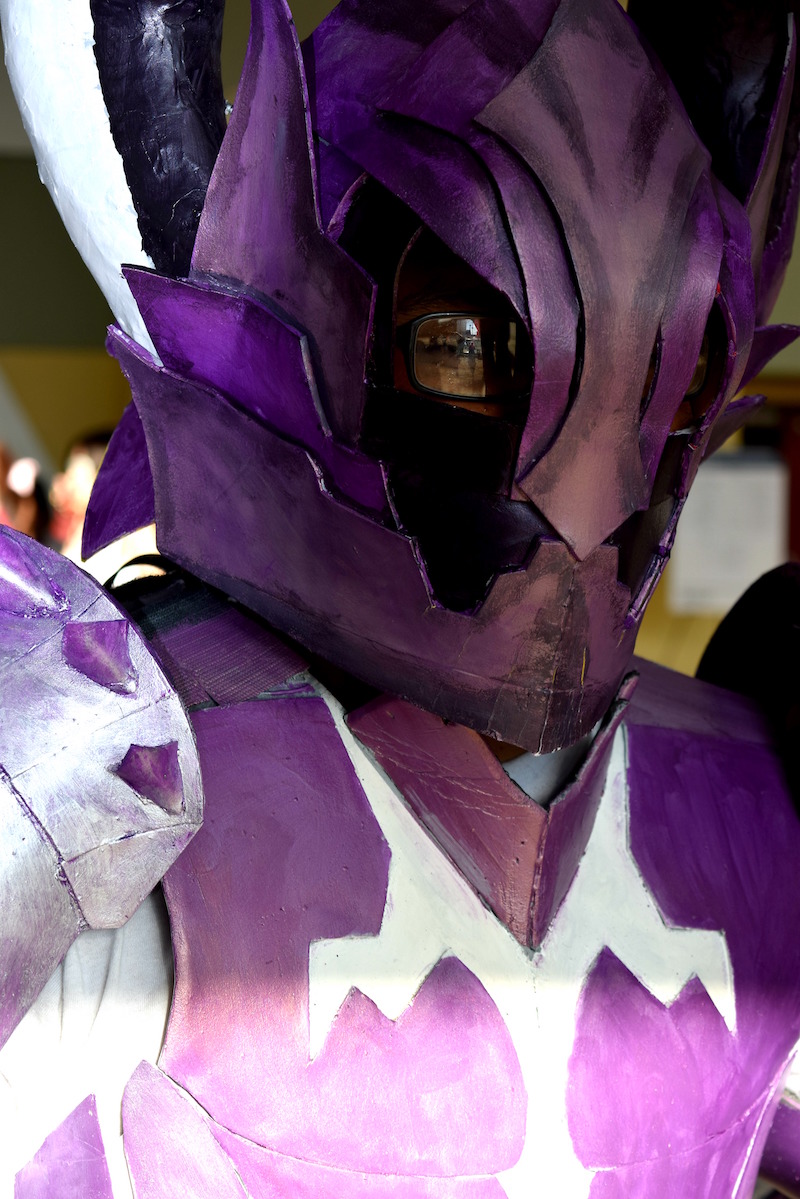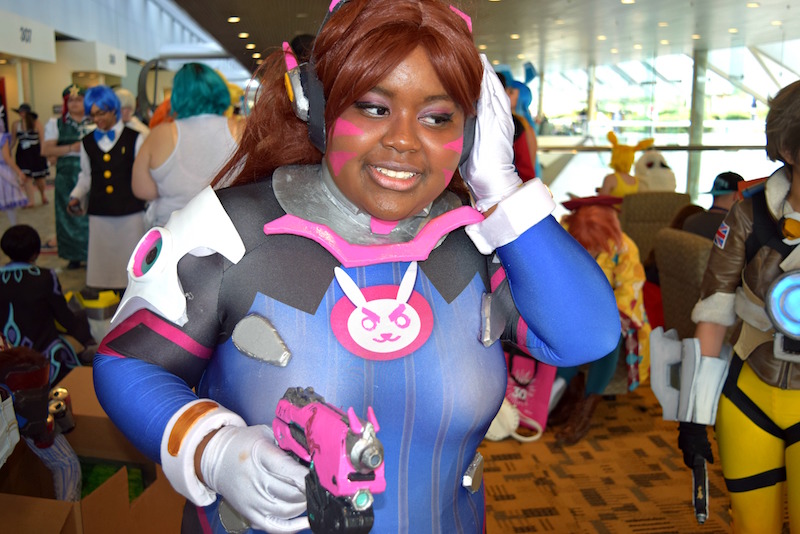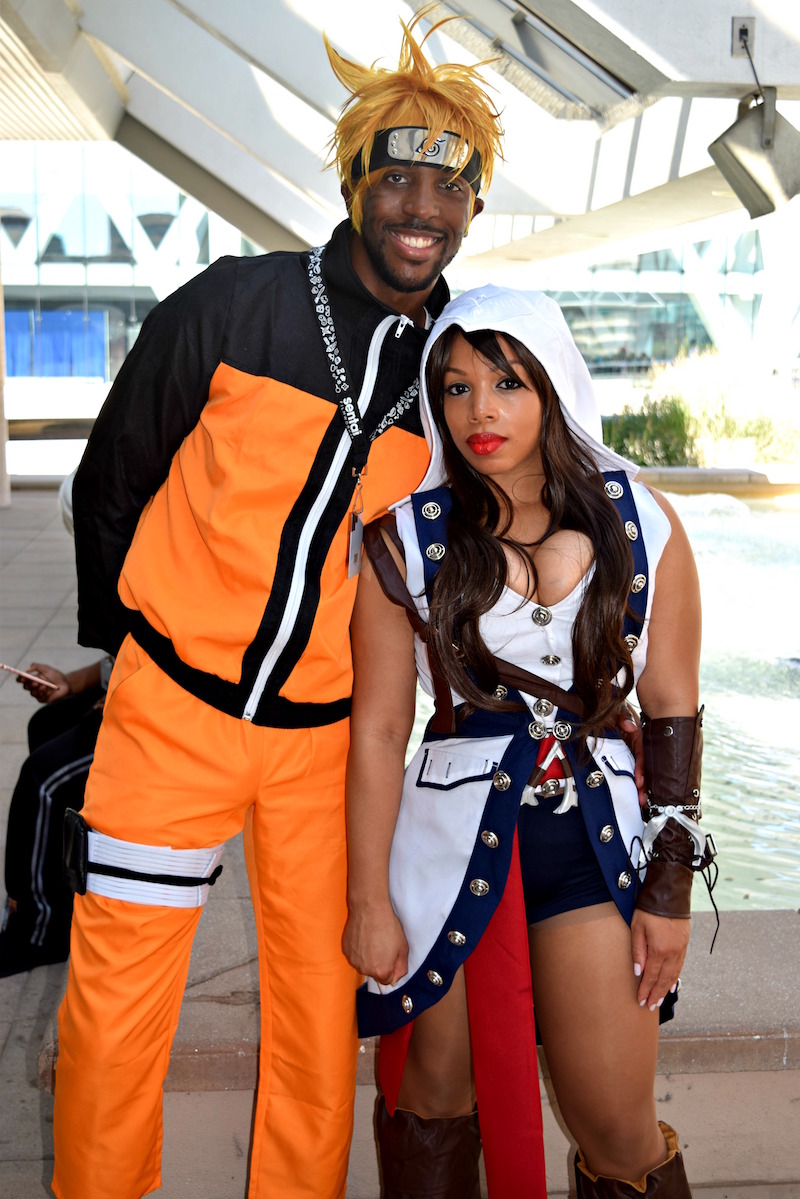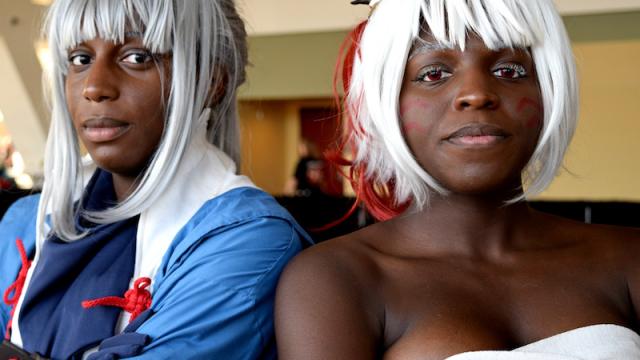Shannon I., 23, didn’t want to leave her Baltimore hotel room. For months, she had been looking forward to Otakon, Baltimore’s annual anime convention, and especially to cosplaying Takumi from Fire Emblem Fates. Trimmed in fur, embellished with red string and topped with a white wig, Shannon’s cosplay was impeccable. She had been striving for exactly that effect over the course of five days, “waking up and doing nothing else but sewing,” she told me at Otakon last weekend. When I found her, she was with her little sister Kimberly, curled up in a far-flung corner away from the crowds.
Shannon I. and Kimberly I. Photo by Cecilia D’Anastasio
“This morning, I didn’t want to put this costume on,” Shannon said. “Maybe it shouldn’t matter to me, but this is not a black character.”
Shannon, like her sister and other black cosplayers interviewed at Otakon, cited her race as a barrier to entry into the cosplay community. It’s not that the cosplay community isn’t welcoming to people of colour — it’s one of the most liberal subsets of the anime and video game communities, a place where all enthusiasm is warmly celebrated. Rather, self-doubt — the internalised fear that, when you put on the skin of your favourite character, your own skin will breach the aesthetic fantasy — can prevent black cosplayers from feeling at ease in cosplay.
Otakon drew over 20,000 anime and video game fans Baltimore, a city that’s two-thirds black, 50 per cent higher than the US national average. There, visibility for people of colour in the so-called nerd community is strong. But despite the city’s racial makeup, and Otakon’s relatively strong turnout for people of colour, black cosplayers interviewed still felt the psychological pressure of marginalisation within the nerd community.
“It’s a lot of internal back and forth,” Kimberly, 20, told me. She was dressed as Rinkah from Fire Emblem Fates, red-eyed with fur cuffs. A chieftain’s daughter, Rinkah is a proud, fierce fighter, qualities that appealed to Kimberly, who appeared more quiet. For the last six years she’d been cosplaying, Kimberly chose characters whose outfits were more concealing, like Candela from Pokemon’s Team Valor and Katara from Avatar: The Last Airbender. Rinkah, however, wears a cropped tube top, showing off her canonically pale stomach and arms.
“I can look good,” Kimberly said, “but I won’t look as good as someone with a lighter skin tone cosplaying this character.” Cosplayers who enjoy having their picture taken — frankly, most of them — can feel like their crafting efforts were for nought if con attendees don’t recognise who they are, or appreciate the aesthetic similarities.

Marcus C. Photo by Cecilia D’Anastasio
Full-body cosplay allows Marcus C., 26, to stay recognisable. Marcus is a remarkably talented cosplayer who crafted an entire Monster Hunter armour set for Otakon, the culmination of his seven years of experience. During our conversation, at least three onlookers took him aside to photograph his eggplant-coloured armour set, which included a helmet.
“Any character who wears masks or full armour, I can get away with,” he told me. When asked whether that’s a function of race, he added, “It’s definitely a hang-up, I’m not gonna lie. I tend to not make things about race, but sometimes, I’m considering a costume, but then it hits me that it might not be received right.” He doesn’t blame onlookers for failing to register his character, thrown-off by differences in race, but accounts for that possibility by drawing attention to his outfit.
Marcus, like Kimberly and Shannon, cosplays more characters from video games than anime, citing the Japanese cartoons’ dearth of people of colour (notable ones including Anthy from Revolutionary Girl Utena, Michiko from Michiko to Hatchin, Afro from Afro Samurai, Mila Rose from Bleach, Geretta from Hunger X Hunter and Karui from Naruto). As kids, many of us grew up with Dragon Ball Z‘s Mr Popo, a dark-skinned slave with puffy red lips; despite the fact that he was not intended to be African-American, he was recoloured blue for American television, indicating his potentially offensive reception.
Japan’s population includes fewer than one per cent minorities, so the visibility of people of colour in anime is contending against some harsh demographic realities. The popularity of American television abroad could help boost black representation in anime (and has, to some degree). But Juan R. 22, a black cosplayer, explained that American media making its way over to Japan doesn’t always portray people of colour in the best light.
“The issue is how Japan sees American culture,” he explained. “Even in American shows, people of colour aren’t main characters a lot of the time. And if you’re in Japan and you’re just going by American television, you’re going to assume there aren’t a lot of minorities in America.”

Sola-Heika cosplay. Photo by Cecilia D’Anastasio
I was wandering around the food area, munching on some stale “Tokyo fried chicken”, when I ran into Sola-Heike, 19, cosplaying D.Va from Overwatch, a South Korean competitive StarCraft player. She wore a full-body D.Va suit, complete with hand-painted armour around her neck and arms, as well as a pink gun and headset. Her eyeshadow even matched her gun. When we sat down outside a cafe, she was sweating from having her picture taken in Baltimore’s sweltering heat. I asked her about history cosplaying.
“I’ve been doing a lot of video game characters recently,” she said. “Once, I was Judal from [the anime] Magi, whose skin is pale. I thought I was doing a really good job, but someone on Tumblr said, ‘Oh, Judal’s been out in the sun too long and ate too many apples.’”
Sola-Heika says she tries to brush off self-doubt, but explained that anxiety about her race has been reflected strongly in her character choices. Over the last six years, she’s gravitated toward darker-skinned video game characters, like Aveline from Assassin’s Creed, but says that the options are woefully limited. Lately, when she chooses white or Asian-reading characters, she feels the need to go all out with costume design to make up for the racial differences.
“I’ve been worried I don’t look like the people I was cosplaying, so I had to be 20 times better at craftsmanship. I think that’s how a lot of black cosplayers feel,” Sola-Heika said. When she cosplayed Transistor’s Red, she made the costume sparkly to better compete with cosplayers who look more like the white, blue-eyed video game character. That way, Transistor fans would acknowledge her hard work. Often, though, she’d been overlooked, despite her painstaking effort. It’s fine, she reasons. She’s just in it for the fun.

Tavis Snell and Kiya A. Photo by Cecilia D’Anastasio
For Shannon’s part, the fear of her achievements being unsung mired her to her hotel room Saturday morning of Otakon. “I was like, ‘I don’t think I should wear this,’” she told me. “I wanted people to acknowledge the work I put into this character. I just want people to look at me and think, ‘She did a good job,’ and not, ‘The person wearing that is the wrong skin colour for that character.’” When no one says anything to her when she’s cosplaying, anxiety takes over. I knew it. I shouldn’t have done anything at all.
Visibility for black cosplayers will help battle these apprehensions, her sister Kimberly said. Including black cosplayers in cons’ advertisements and social media posts will draw in more people of colour who don’t see themselves reflected in their favourite anime and video game characters, or in the so-called nerd community. Having a role model, Kimberly added, also can help assuage black cosplayers’ misgivings about cosplaying lighter-skinned characters, especially from anime.
“If Shannon hadn’t done this, I wouldn’t have been as inclined to come to Otakon,” Kimberly said. “If it wasn’t for her, I don’t know if we’d be going to any conventions at all.”

Comments
11 responses to “Black Cosplayers Talk About Self-Doubt”
Maybe it’s time we have a chat about Cultural appropriation
Much troll ;P
Its sad that people should still feel so uncomfortable with self doubt in this day and age especially in connection to their race.
All their skills are remarkable and they look amazing.
I hope that they continue to cosplay as characters they want, and the community shows a bit more support.
Fair enough, people can be pretty shitty.
That assassins creed top looks awfully tight, seems like it would be uncomfortable, but she looks awesome in it.
While the race issue seems to still be prevalent in a lot of areas in society, feeling comfortable enough to do Cosplay can be hard enough regardless. Not only from the perspective of physical self confidence, but also if you put in a lot of effort only to have people make snarky comments. I guess we never leave highschool.
“Why is that asian cosplaying a white character? Why is that white person cosplaying an asian? Why is that bearded man cosplaying as a loli?”
You can’t escape discrimination, everyone does it to others and everyone does it to themselves.
“I’m too short, I don’t have large breasts, I’m too fat, I’m not muscular enough, my head’s too big to fit inside this Gundam, I’m ugly”.
First world problems.
If it bothers you, you could always move to the third world ^_^
I sure am glad that you, as a first world citizen and thus most qualified to change the world, have taken time out your busy schedule helping to solve second and third world problems to pass judgement on those not doing the same.
WOW! after reading this article, I have come to realise there’s unrealistic expectations when it comes to cosplaying 2d characters…… *mind blown*
What about the 3d characters?
Both Takumi and Rinkah are spot on, I immediately recognised them and anyone who doesn’t respect their effort is an asshole. The other costumes are good too, just haven’t played/watched the media in question, apart from the Naruto one (which is, again, really good).